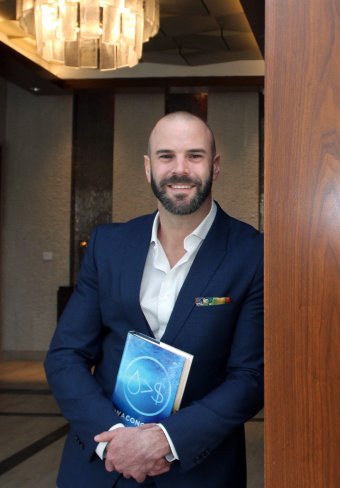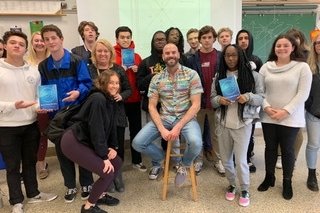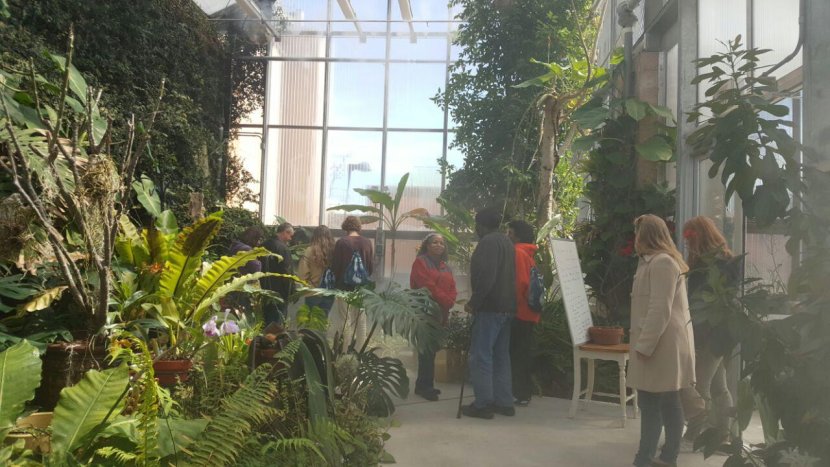Michael Zitron wrote the book "Waconomics: Redefining Water's Role in Our Economy." Photo David B. Hollingsworth/ODU
Michael Zitron is shown with students at First Colonial High School, which offers an economics class that focuses on water. Photo courtesy of Michael Zitron
By Joe Garvey
Did you know that:
- 37 gallons of water are needed to grow, package and ship enough coffee to make one cup, and 2,000 to produce one gallon of milk.
- Producing one barrel of oil requires 7.6 barrels of water (319 gallons).
- 3,000 gallons of water are used to produce one semiconductor, and 32 liters are used to make one microchip.
- China has 22 percent of the world's population, 9% of its arable land, but only 6% of the world's water.
Michael Zitron does. Those are among statistics the Old Dominion University alum cites in his book, "Waconomics: Redefining Water's Role in Our Economy." Zitron, who graduated with a degree in international business with a Latin American concentration in 2012, has made raising awareness of water's importance his passion. In addition to publishing "Waconomics" in 2018, he founded the nonprofit Water M. Mission in 2017.
"What's shocking is not the human rate of water consumption," he writes, "but how grossly we undervalue this mainstay of our very existence." In many places in the United States, he notes, water costs less than one cent per gallon.
Zitron became particularly interested in water's role in the economy after studying coups in South America after World War II - a continent which contains 31% of the world's freshwater and two-thirds of its oxygen via the Amazon rainforest.
The EPA established the Clean Water Act and Safe Drinking Water Act (1972-1974), giving water a higher value. "In the 1970s the U.S. became predominantly service-based while the output of water-intensive manufacturing declined and industry slowed at home," he writes in "Waconomics." As that played out, corporations left the United States in pursuit of cheap, unregulated freshwater for production means. Zitron sees a connection between Vietnam's vast water supply and why so many goods are produced in that country today.
He said in an interview that Water M. Mission's role is "to be water's voice. What Water M. Mission is successfully doing is teaching citizens and cities and corporations how to read between the lines of the economy using water."
Toward that end, Water M. Mission infused its first successful course work into state economic standards - placing water at the forefront of an economics class - at First Colonial High School in Virginia Beach. Zitron leads his organization by volunteering and speaking in Hampton Roads' public and private schools, collaborating with California-based nonprofits on school initiatives and working with PACs and non-governmental organizations around the world. Money raised through sales of "Waconomics" is being used to support other water nonprofits that are building wells and rain-harvesting systems in developing countries.
"We're being solution-based in our presentations," he said. "But also, we're addressing the acute issues, which are the emotional heartstrings in it all. The most important one to us is that we're slowly building a fund that is going to focus on disease and water research. How does cancer connect to water quality? Is autism affected by the water below, and how long term is it? ... We hear about these neighborhoods and these streets where there are five cases of breast cancer or stomach cancer. What's the connection?"
He said the United States needs to make a significant investment in its pipes, which in our largest cities are as old as the Civil War, for health and economic reasons. On average, 30% of our water leaks from our pipes every second of every day. In developing countries, the pipes leak upwards of 70% daily.
"If we were to wake up and realize that the money in our bank account was leaking at 30% every day, we'd call the banks first thing in the morning," he said. "But the issue is that that the pipes aren't a sexy topic and they're under the radar for most."
And it makes economic sense to fix the pipes. He notes that water.org calculates that for every dollar invested in water and sanitation, the economy gets an $8 return.
"What's needed is a system that more closely ties the value of our currency and purchasing power to real water costs," Zitron writes in "Waconomics." "When water is priced according to its true availability, only then will we be able to recapture the competitive edge."
He said that because water is in everything - 90% goes to agriculture, manufacturing and energy production - "water is more powerful than money." It causes societies to thrive or regress.
That's why he calls water our superhero - and our super villain.
"We know water is a super villain because of how too much water affects the home with flooding and storm surge. And we know what happens to the value of a home when not enough water is available. The equity and value falls," Zitron said. "And we know what happens when the quality of water goes toxic and enters our body."
The demands on water are growing. In "Waconomics" he writes that the United Nations projects that Earth will face a 40% shortfall by 2035 because of urbanization, population growth and increasing demand to produce food, energy and industry. This scarcity could lead to more global conflicts. He feels that areas with the least water have the most terrorism, highest extremes in gender inequality and fewest opportunities.
Zitron believes if we learn how to create less water-intensive economies at home, there will be surplus dollars to improve infrastructure in developing countries. In that way, the United States can become a beacon for water diplomacy.
Zitron is grateful for the opportunities he received at ODU. He said professors gave students "a chance to really take a risk and dive deeper into education." During his time at Old Dominion, he worked for Quad Chemical under alumna Sarah Hall, backtesting his water theories as he traded and tracked commodities internationally.
And he said he's optimistic about water's future as our superhero.
"The profit from the City of Norfolk's water supports the police and the libraries," he said. "Because the money generated from water can save the police who protect us, water can also save our residents and our corporate partners."
"We know that it's not too late," he added. "This book is going to be more relevant in 10 years. Waconomic thinking is going to be more important than ever."
Related News Stories
Kaplan Conservatory Director Caught ‘Orchid Fever’ at a Young Age
“It’s amazing what orchids do to people,” Darrin Duling says. “They mimic, trick and deceive pollinators, and I think they are doing it to us, too.” (More)
ODU Receives $3 Million for Resilience from Philanthropist Joan Brock
ODU alumna and philanthropist Joan Brock donates $3 million to the University's Institute for Coastal Adaptation and Resilience. (More)
Allan Kirk ’83, a Leading Kidney Transplant Surgeon, Feels “Married” to his Patients
His deeply personal approach has served him well in his role as chairman of the surgery department at Duke University Medical Center. (More)







